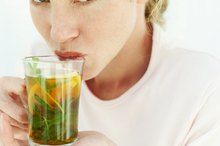What does fact checked mean?
At Healthfully, we strive to deliver objective content that is accurate and up-to-date. Our team periodically reviews articles in order to ensure content quality. The sources cited below consist of evidence from peer-reviewed journals, prominent medical organizations, academic associations, and government data.
The information contained on this site is for informational purposes only, and should not be used as a substitute for the advice of a professional health care provider. Please check with the appropriate physician regarding health questions and concerns. Although we strive to deliver accurate and up-to-date information, no guarantee to that effect is made.
Why Does Gatorade Relieve Headaches?
Headaches can be caused by a large variety of reasons, but some headaches that you may suffer from are caused by dehydration, or a lack of necessary fluid in your body 1. Gatorade, the popular sports drink,may help alleviate your dehydration-related headaches even better than water alone 12. Instead of thinking of Gatorade as helping to treat your headaches, it’s important to realize that the sports drink really helps you to fix the actual cause of your headache.
Dehydration and Headaches
Dehydration is a result of your losing more fluid, whether from breathing, sweating or urination, than you are consuming 1. When the amount of fluid in your body is limited, your body adapts by conserving water and shifting it from one place to another to make sure that the areas that need it the most are covered. Your headache is your body’s signal that you need to provide it with more fluids. In some circumstances, your headache may be accompanied by nausea or dizziness.
- Dehydration is a result of your losing more fluid, whether from breathing, sweating or urination, than you are consuming 1.
- Your headache is your body’s signal that you need to provide it with more fluids.
Needed Treatment
The Best Thirst Quenchers
Learn More
If your body gets to a dehydrated state, it’s making pH changes in the blood stream so that your most vital organs, such as your brain and your heart, are still provided with enough fluids. To treat the lack of fluid at this point, you not only need to consume water, but you need electrolytes to regulate and normalize your pH levels.
Water vs. Gatorade
Gatorade is thought to be superior over water in helping headaches that are caused by dehydration because it is able to rehydrate you more efficiently 12. Gatorade also consists of carbohydrates and electrolytes, which facilitate fluid absorption in your body. Sodium, an essential electrolyte found in Gatorade, helps you to keep fluid in your body instead of losing it by urination.
Time Frame
How Many Liters of Water Should You Drink?
Learn More
According to the Gatorade Sports Science Institute, the presence of carbohydrates allows the fluid to be absorbed seven times faster than if you were to just consume water 2. It should take approximately an hour for you to start feeling better after drinking 16 oz. of Gatorade, but you should continue to consume more of the sports drink beyond the time that you start to feel better. It’s suggested that you sip the drink slowly to prevent your stomach from becoming water-logged.
- According to the Gatorade Sports Science Institute, the presence of carbohydrates allows the fluid to be absorbed seven times faster than if you were to just consume water 2. of Gatorade, but you should continue to consume more of the sports drink beyond the time that you start to feel better.
Prevention/Solution
Headaches you have that are caused by dehydration can easily be prevented if you consciously consume adequate fluids throughout the day 1. You should make extra effort during strenuous exercise or in high-temperature and high-humidity climates. While Gatorade will help rehydrate you more efficiently when you’re dehydrated, simple water is adequate for preventing you from becoming dehydrated 2.
Related Articles
References
- MayoClinic.com: Dehydration--Symptoms
- Potera C. Diet and nutrition: The artificial food dye blues. Environ Health Perspect. 2010;118(10). doi:10.1289/ehp.118-a428
- Color Additives Questions and Answers for Consumers. Food and Drug Administration. Updated January 4, 2018.
- Malik VS, Popkin BM, Bray GA, Després JP, Hu FB. Sugar-sweetened beverages, obesity, type 2 diabetes mellitus, and cardiovascular disease risk. Circulation. 2010;121(11):1356-1364. doi:10.1161/CIRCULATIONAHA.109.876185
- Cordrey K, Keim SA, Milanaik R, Adesman A. Adolescent consumption of sports drinks. Pediatrics. 2018;141(6). doi:10.1542/peds.2017-2784
- Pearlman M, Obert J, Casey L. The association between artificial sweeteners and obesity. Curr Gastroenterol Rep. 2017;19(12). doi:10.1007/s11894-017-0602-9
- Health Effects of Sugary Drinks. Boston Public Health Commission.
- Sports Drinks. Harvard T.H. Chan School of Public Health.
- Cordrey K, Keim SA, Milanaik R, Adesman A. Adolescent consumption of sports drinks. Pediatrics. 2018;141(6). doi:10.1542/peds.2017-2784
- Field A, Sonneville K, Falbe J, Flint A, Haines J, Rosner B, Camargo C. Association of sports drinks with weight gain among adolescents and young adults. Obesity, 22(10), pp.2238-2243. doi:10.1002/oby.20845
- Story M, Klein L. Consumption of Sports Drinks by Children and Adolescents. An Issue Brief. Healthy Eating Research. Published June 2012.
- Trasande L, Shaffer R, Sathyanarayana S. Food additives and child health. Pediatrics. 2018;142(2):e20181408. doi:10.1542/peds.2018-1408
Writer Bio
Kim Nunley has been screenwriting and working as an online health and fitness writer since 2005. She’s had multiple short screenplays produced and her feature scripts have placed at the Austin Film Festival. Prior to writing full-time, she worked as a strength coach, athletic coach and college instructor. She holds a master's degree in kinesiology from California State University, Fullerton.









